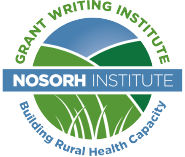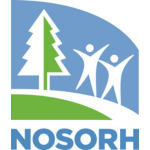Rural Health Grant Writing Institute

The NOSORH Rural Health Grant Writing Institute was developed to meet the unique needs of rural grant writers — like you! Through nine engaging sessions, participants will gain the skills and strategies needed to write successful grants, including documenting needs, crafting budgets, developing evaluations and work plans, and finding the right funding opportunities. With an emphasis on federal funding – particularly rural-focused opportunities from the Health Resources and Services Administration (HRSA) – this Institute equips participants with the knowledge to navigate complex grant applications and secure critical resources for their communities. Take the next step in advancing your grant writing skills and driving meaningful change in rural health.
Intended Audience
State Offices of Rural Health staff and rural health stakeholders, such as Critical Access Hospitals, Rural Health Clinics, Free Clinics, Federally Qualified Health Centers, health departments, and community-based organizations.
Instructor
Teryl Eisinger has over 25 years of grant management experience, focusing on rural health and community development. She is a respected leader and passionate advocate for rural communities.
Schedule & Content
The nine-session Institute runs from April 7 to May 5, 2025. Virtual learning sessions will occur on Mondays and Wednesdays from 3:00 to 4:30 PM ET.
Register
Register now for the Rural Health Grant Writing Institute:
Registration deadline: March 21, 2025.
+ Curriculum
Session 1: April 7, 2025
Getting Started on Writing a Proposal
Make a good start! Ask important questions before starting to write a grant application, learn how to develop a concept, and plan for the success of your grant writing team.
Session 2: April 9, 2025
How to Use Data to Make the Case for Rural
This session will provide an overview of how and where to find rural health data and how to use it effectively in a grant proposal. Participants will learn how to present data for small populations and learn where to find valuable data visualization resources.
Session 3: April 14, 2025
The Importance of Community Partners
Funders see added value in working with other organizations. Establishing effective and inclusive partnerships takes time. It is important to create the right framework from the start and review the structure and process of the partnership on an ongoing basis.
Session 4: April 16, 2025
Creating a Logic Model Foundation and Solid Work Plan
Participants will learn how to develop a logic model that provides a foundation for effective work plans to make them accurately reflect their project. Learn how to use action words to write compelling goals and objectives and how to build a timeline to show an immediate impact for the funder.
Session 5: April 21, 2025
Developing a Strong Evaluation
What is evaluation, and why is it important? What are the components of a strong evaluation plan? Learn how to develop and write a program evaluation plan that can ensure a successful project and demonstrate impact to the funder.
Session 6: April 23, 2025
Creating a Winning Budget
Learn the basic elements of a grant application budget, such as how much detail to include, writing compelling budget justifications, and strategies for a winning proposal.
Session 7: April 28, 2025
A Narrative that Tells Your Story – Facts & Faces
How you write can be as important as what you write! Learn how to frame your project to stand out among other applications and tell your story. Participants will learn about the basic components of the application narrative, writing tips, and how to avoid the common pitfalls of bad writing and grammar.
Session 8: April 30, 2025
Submitting a Complete Application and Beyond
Participants will learn the importance of meeting all grant requirements to maximize their scores and improve their chances of receiving funding. Just because the grant is submitted, does not mean the grant process is over. Learn key strategies for developing relationships to increase chances of receiving subsequent funding.
Session 9: May 5, 2025
Finding Funding and Other Resources to Support Your Proposal
Whether public or private funds, it is important to identify the best match for your needs, your proposal, and your organization. Participants will explore resources and websites to discover the right funders for their program.
+ Technology & System Requirements
Participants will use iSpring, an online Learning Management System (LMS), to access handouts, presentation materials, recorded sessions, and communicate with the course instructor. Live sessions will be conducted via Zoom. Recordings of the presentations will be available for playback within 24 hours of the session date.
Only those registered for the NOSORH Rural Health Grant Writing Institute will be provided a personal iSpring login, allowing them to join the sessions and view class materials. Failure to comply may result in access restrictions. Participants will be sent an email with further course details and login information by March 24th.
Payment
The course fee of $1000 is due by April 7, 2025. Credit card payments are accepted. If you are unable to pay by the deadline or require specialized billing arrangements, please contact Kayren Cross at kayrenc@nosorh.org or (888) 391-7258, ext. 108.
Refund policy
To be considered for a refund, requests must be submitted in writing to Kayren Cross at kayrenc@nosorh.org.
Deadlines to request a refund:
- On or before April 11 – full refund
- After April 11 – no refund
Need Help?
If you have questions about this Institute, please contact Cate Visser, NOSORH Applications Manager, at catev@nosorh.org.
What participants are saying about our Grant Writing Institute:
“I will use the tools and references to train other colleagues in our rural and frontier healthcare network.”
“This was a great experience for me. I gained a tremendous amount of knowledge on how to write a grant, things to look for, and the do’s and don’t of grant writing.”
“Great course, loved that there was optional homework and no small group work, which can often detract from educational experiences for me. Have already started using some of the material on a grant I am currently writing.”
